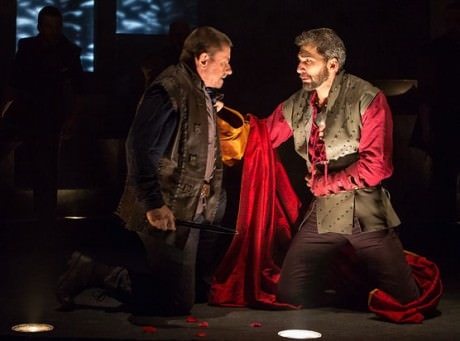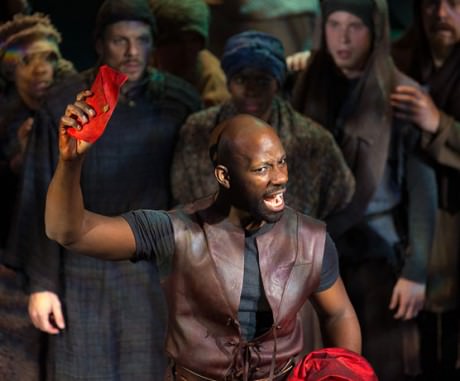Shakespeare, the humanist; Shakespeare, the poet; Shakespeare, the political playwright; Shakespeare, the fatalist.

Before he passed away, my 87-year-old father used to quiz members of the younger generations whom he’d meet at grocery stores and the like on their knowledge of history. He’d ask them: “Who crossed the Rubicon?”
He’d get mostly blank looks, the occasional “Rubicon? Never met him. Is he famous?” Rarely did he get: “Julius Caesar!”
Director Robert Richmond’s Julius Caesar and its illuminated production now playing at the Folger Theatre would have made my father proud. Its tragic ritual and the hooded actors who perform its dance of destruction elevate history into the realm of religious enactment. And, as a result, the audience sits in witness to the demise of good and honorable men.
For our review, click here.
The most honorable of those men is the Everyman, Brutus. You will not find a more reasonable, noble-hearted, loving, compassionate assassin anywhere. The Tragedy of Julius Caesar is his tragedy. It is his demise that makes the audience suffer, for in him they see themselves, in many ways an ordinary man faced with an extraordinary situation.
In 49 B.C. Rome was a Republic. Roman leaders and generals returning from military campaigns were not allowed to bring their armies into Italy. The Rubicon, the river then on the northern edge of Italy, was a boundary not to be crossed; the General and soldiers who did so were considered outlaws and traitors.
In 49 B.C. a triumphant Julius Caesar, returning home from successful invasions of Gaul and Briton, used his popularity and brought his army over the Rubicon and declared himself dictator of the Roman Republic. Five years later, fearful that republican government was at an end, a group of senators, led by Caesar’s friend Marcus Junius Brutus, assassinated Caesar.
Civil war erupted, and ironically, a few years later the Republic came to an end, and the Imperial Roman Empire began.
And, as Cassius says, unaware of the cosmic irony swirling around him:
“The fault, dear Brutus, is not in our stars,
But in ourselves, that we are underlings.”
Folger’s production of the classic text proves that Shakespeare’s insights into the workings of politics and human nature are spot on, for the 400-year-old text about a twenty-one-hundred-year-old coup and civil war speaks as boldly about events today as it must have at its original performance during Elizabeth I’s final years with her uncertain succession looming.
Many of us look with disgust, as Cassius does, at the politics of power: an arrogant, but very talented Caesar, the richest man in Italy, declares himself dictator.
Some of us, as the thoughtful, temperate Brutus does, agonize over the direction of the country. If a poll had been taken in 49 B.C., uncertainty would surely have reigned. If a poll had been taken in 1776, a divided colony would have deadlocked in despair. What happened next?
- Think Articles of Confederation and a non-existent Federal government.
- Think Constitution and the binding of the States in Federalism.
- Think the Imperial Presidency and the weakening of congressional powers.
- Think of all the bitter in-fighting, the backroom deals and the back-stabbing.
- Think impeachment, or rather the absence thereof: assassination by any other name would end as bitterly.
Yet, social upheaval, civil war, regime change—the overturning of a corrupt, inefficient status quo equals slaughter and bloodshed as the battle for power rages.
- Think American Revolution.
- Think French Revolution.
- Think 1968.
- Think People Power in the Philippines.
- Think collapse of the financial system.
- Think Arab Spring.

In Richmond’s brilliant production—the man really knows how to read a Shakespearean text and make it as human as kitchen sink realism—the meaning of Caesar’s fateful decision to cross that Rubicon drones like evil spirits in our ears, and Caesar’s words: “Alea iacta est” (“The die is cast”) couldn’t be clearer, particularly as they relate to dear Brutus.
Certain decisions lead to a certainty of results. As in chess, the fateful move happens long before the final move. Watching Julius Caesar, mesmerized as we are by the excellent acting and the superlative designs, we are nevertheless aware that the tragedy is certain: that there is no reverse on this train roaring to a head-on with a mountain, that the gods of tragedy like the gods of war and coups and revolutions and assassinations lead to slaughter and mayhem and death.
- Think World War I
- Think World War II
- Think Cold War
- Think the War on Terror
There are no winners and losers, good guys and bad guys, saviors and anti-christs. Each man or woman makes his or her decision to drink to loyalty, or shake hands with treason, or fall on one’s sharpened sword, and that decision has little to do with some larger sense of history.
Right and wrong like clouds passing before the sun only dim the vista of what is about to come.
The ritual of change takes us where it wishes. And we must await the outcome of the game.
Folger’s Julius Caesar should not be missed: its metaphysics, like its tragic dirge, will take you places that this melodramatic world dare not: into your own tragic heart.
Running Time: Two hours, with one 15- minute intermission.
Julius Caesar plays through December 7, 2014 at Folger Theatre at the Folger Shakespeare Library—201 East Capitol Street, SE, in Washington, DC. For tickets, call the box office at (202) 544-7077, or purchase them online.
LINKS:
Review of Julius Caesar by Sophia Howes on DCMetroTheaterArts.
In the Moment: “Julius Caesar’ at Folger Theatre (review) on DCMetroTheaterArts by David Siegel.
Spine: ‘Julius Caesar, “et tu Brute?” and You’ by Robert Michael Oliver on DCMetroTheaterArts.





